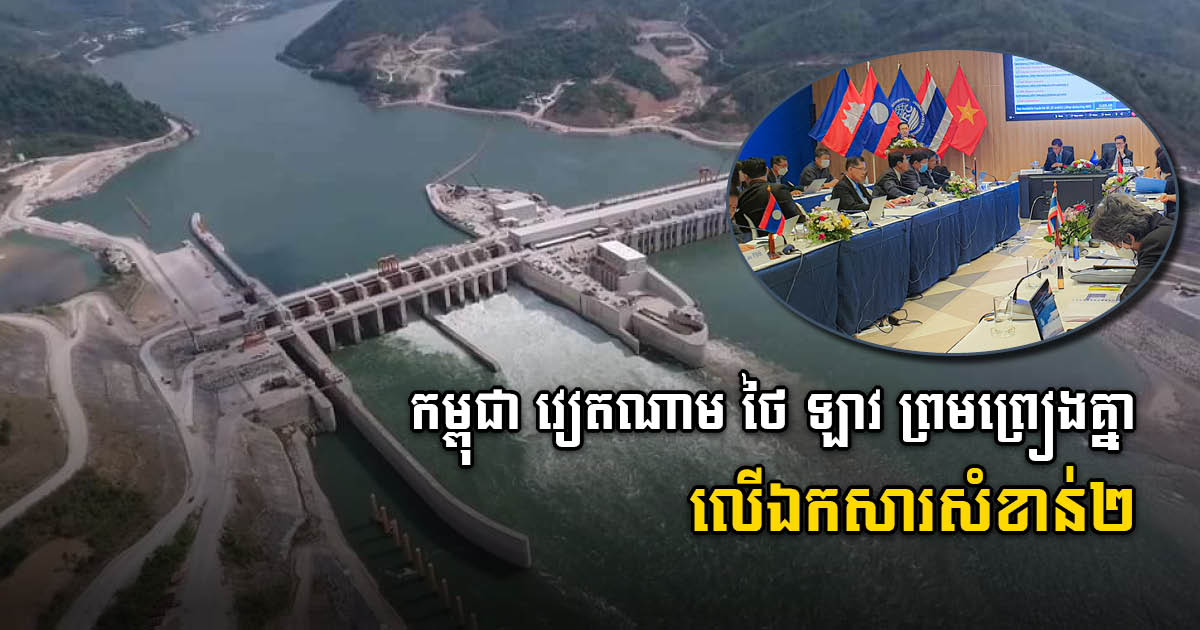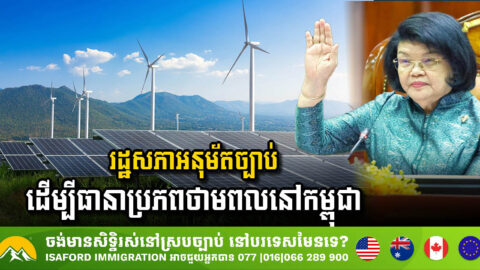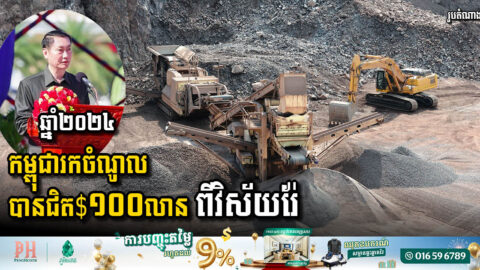កម្ពុជាដាក់ចេញយុទ្ធសាស្ត្រថ្មី ដើម្បីកាត់បន្ថយការបំពុលឧស្ម័នផ្ទះកញ្ចក់
ក្នុងជំហានដ៏សំខាន់មួយឆ្ពោះទៅរកការដោះស្រាយការប្រែប្រួលអាកាសធាតុ ក្រសួងបរិស្ថានបានដាក់ចេញជាផ្លូវការនូវផែនការយុទ្ធសាស្ត្រប្រកបដោយមហិច្ឆិតា សំដៅដល់ការកាត់បន្ថយការបំភាយឧស្ម័នផ្ទះកញ្ចក់ ពីឆ្នាំ ២០២៤ ដល់ឆ្នាំ ២០៣៣។ ផែនការនេះ ត្រូវបានប្រកាសដាក់ឱ្យប្រើប្រាស់ កាលពីថ្ងៃទី២២ ខែឧសភា ឆ្នាំ២០២៥ ក្រោមអធិបតីភាព ឯកឧត្តម អ៊ាង សុផល្លែត រដ្ឋមន្ត្រីក្រសួងបរិស្ថាន។ ពិធីប្រកាសនេះក៏មានការអញ្ជើញចូលរួមពី ឯកឧត្ដម Igor Driesmans ឯកអគ្គរាជទូតពិសេសនៃសហភាពអឺរ៉ុបប្រចាំនៅកម្ពុជា និងលោកស្រី Alissar Chaker តំណាងកម្មវិធីអភិវឌ្ឍន៍អង្គការសហប្រជាជាតិនៅកម្ពុជាផងដែរ។ ក្នុងពិធីខាងលើនេះ ឯកឧត្តម ស៊ុម ធី អគ្គនាយកនៃអគ្គនាយកដ្ឋានគោលនយោបាយ និងយុទ្ធសាស្ត្រនៅក្រសួងបរិស្ថាន បានបញ្ជាក់ថា ផែនការយុទ្ធសាស្ត្រនេះ ផ្ដោតលើការកាត់បន្ថយការបំពុលឧស្ម័នផ្ទះកញ្ចក់ ការពង្រឹងសមត្ថភាពបង្កើតភាពបត់បែនចំពោះបញ្ហាប្រែប្រួលអាកាសធាតុ និងការលើកស្ទួយរដ្ឋបាលល្អ និងបំលែងឌីជីថល។ ចំណែក លោកស្រី Alissar Chaker បានឱ្យដឹងដែរថា ផែនការយុទ្ធសាស្ត្រនេះ មិនមែនជាឯកសារគោលនយោបាយតែប៉ុណ្ណោះទេ ប៉ុន្តែជាផែនទីបំពេញចក្ខុវិស័យរបស់កម្ពុជា ក្នុងការឈានទៅរកភាពអព្យាក្រឹតកាបូន និងភាពធន់ចំពោះអាកាសធាតុ តាមរយៈការអភិវឌ្ឍប្រកបដោយចីរភាព។ ដោយឡែក ឯកឧត្តម Igor Driesmans បានបញ្ជាក់ពីការប្តេជ្ញាឡើងវិញរបស់សហភាពអឺរ៉ុប ដោយលើកឡើងពីគោលបំណងប្រមូលផ្តុំក្រុមហ៊ុនអឺរ៉ុប […]
សភាកម្ពុជាអនុម័តសេចក្តីព្រាងច្បាប់ឱ្យក្រុមហ៊ុនវិនិយោគវិស័យអគ្គិសនីចំនួន២៤
សភាកម្ពុជាបានអនុម័តសេចក្តីព្រាងច្បាប់ស្តីពី ការទូទាត់របស់រាជរដ្ឋាភិបាល ឱ្យក្រុមហ៊ុនវិនិយោគវិស័យអគ្គិសនីចំនួន២៤។ នេះបើតាមសម័យប្រជុំរដ្ឋសភាលើកទី៤ នីតិកាលទី៧ នៅថ្ងៃទី២២ ខែឧសភា ឆ្នាំ២០២៥។ ការអនុម័តច្បាប់ទាំង ២៤នេះ ធ្វើឡើងក្នុងគោលបំណងឆ្លើយតបទៅនឹងតម្រូវការអគ្គិសនីដែលកើនឡើងជាបន្តបន្ទាប់រហូតដល់ឆ្នាំ២០២៨ ដោយផ្អែកតាមផែនការមេអភិវឌ្ឍន៍វិស័យថាមពល អគ្គិសនីនៅព្រះរាជាណាចក្រកម្ពុជា (២០២០.២០៤០) និងផែនការមេថ្មីដែលបានធ្វើបច្ចុប្បន្នភាព នៅឆ្នាំ២០២៤។ ទន្ទឹមនឹងនេះ ការរឹតបន្តឹងវិធានការរបស់ពិភពលោកលើគម្រោងអភិវឌ្ឍរោងចក្រផលិត អគ្គិសនីដុតធ្យូងថ្ម ដែលកម្ពុជា បានចុះហត្ថលេខាតាំងពីមុនឆ្នាំ២០១៩ ទាំងការអភិវឌ្ឍក្នុងប្រទេស ទាំងការនាំចូល អគ្គិសនីពីប្រទេសឡាវ ត្រូវបានជាប់គាំង ជាហេតុការផ្គត់ផ្គង់អគ្គិសនី នៅកម្ពុជាពីឆ្នាំ២០២៥ ដល់ ឆ្នាំ២០២៨ អាចប្រឈមនឹងកង្វះប្រភពអគ្គិសនី ប្រសិនបើមិនមានការរៀបចំការអភិវឌ្ឍ ប្រភពអគ្គិសនីថ្មីមកជំនួសឱ្យបានទាន់ពេលវេលា។ បើតាមសម័យប្រជុំខាងលើ រដ្ឋសភា បានប្រជុំពិភាក្សា និងអនុម័តសេចក្ដីព្រាងច្បាប់ចំនួន២៤ ស្តីពីការអនុម័តយល់ព្រមលើការធានាទូទាត់របស់រាជរដ្ឋាភិបាលនៃព្រះរាជាណាចក្រកម្ពុជា ឱ្យក្រុមហ៊ុនវិនិយោគវិស័យអគ្គិសនី នៅព្រះរាជាណាចក្រកម្ពុជា ដូចខាងក្រោម៖ ១. ក្រុមហ៊ុន បានយ៉ាន អេនើជី ឯ.ក សម្រាប់គម្រោងវិនិយោគស្ថានីយផលិតអគ្គិសនី ដើរដោយថាមពលពន្លឺព្រះអាទិត្យ អានុភាព ៣០០មេហ្កាវ៉ាត់ នៅខេត្តកំពង់ឆ្នាំង។ ២. ក្រុមហ៊ុន វេ សាន់ ស៊ី.អេ.ភី […]
ក្នុងឆ្នាំ២០២៤ កម្ពុជារកចំណូលបានជិត ១០០លានដុល្លារ ពីវិស័យរ៉ែ កើនជិត ៨០%
ក្នុងឆ្នាំ២០២៤ កន្លងទៅនេះ ក្រសួងរ៉ែ និងថាមពល បានប្រមូលចំណូលមិនមែនសារពើពន្ធពីវិស័យរ៉ែបានជិត១០០លានដុល្លារ កើនឡើង ៧៩ % ខណៈបច្ចប្បន្នកម្ពុជាមានការដ្ឋានរ៉ែជាច្រើន សម្រាប់ផលិតផលរ៉ែបំពេញតម្រូវការក្នុងស្រុក និងនាំចេញ។ នេះបើយោងតាមប្រសាសន៍ឯកឧត្តម កែវ រតនៈ រដ្ឋមន្រ្តីក្រសួងរ៉ែ និងថាមពល ក្នុងពិធីសម្ពោធបើកឱ្យដំណើរការជាផ្លូវការ រោងចក្រផលិតស៊ីម៉ងត៍ នៅស្រុកឱរ៉ាល់ ខេត្តកំពង់ស្ពឺ នៅថ្ងៃទី២០ ខែឧសភា ឆ្នាំ២០២៤។ នាឱកសនោះ ឯកឧត្តម បានឱ្យដឹងថា នៅក្នុងឆ្នាំ២០២៤ កន្លងទៅនេះ ក្រសួងរ៉ែ និងថាមពល បានប្រមូលចំណូលមិនមែនសារពើពន្ធពីវិស័យរ៉ែជូនរដ្ឋបានប្រមាណជិត ១០០លានដុល្លារ ការកើនឡើងប្រមាណ ៧៩% ធៀបនឹងឆ្នាំ២០២៣។ លើសពីនេះ ឯកឧត្តមបានកត់សម្គាល់ថា ខេត្តកំពង់ស្ពឺតែមួយបានចូលរួមចំណែកប្រមាណ ៥លានដុល្លារក្នុងចំណូលមិនមែនសារពើពន្ធក្នុងឆ្នាំ២០២៤ ខណៈក្នុងត្រីមាសទី១ ឆ្នាំ២០២៥នេះ ក៏បានរួមចំណែកប្រមាណ ១លានដុល្លារ និងបង្កើតការងារជូនបងប្អូនប្រជាពលរដ្ឋប្រមាណ ១៦០០នាក់ ពីការដ្ឋានចំនួន ៧៦កន្លែង ក្នុងខេត្តកំពង់ស្ពឺ ផងដែរ។ ឯកឧត្តមបន្ថែម បច្ចុប្បន្នក្រសួងរ៉ែ និងថាមពល កំពុងពិនិត្យ និងវាយតម្លៃការស្នើសុំប្រើប្រាស់មូលនិធិរ៉ែសម្រាប់អនុវត្តន៍គម្រោងថ្មីចំនួន ៩គម្រោងបន្ថែមទៀត […]
ADB គ្រោងវិនិយោគ $១០ពាន់លាន ដើម្បីសម្រេចចក្ខុវិស័យបណ្តាញថាមពលអាស៊ានឱ្យក្លាយជាការពិត
នៅក្នុងចលនាដ៏សំខាន់មួយក្នុងគោលបំណងធ្វើបដិវត្តន៍ប្រព័ន្ធថាមពលនៅទូទាំងអាស៊ីអាគ្នេយ៍ ធនាគារអភិវឌ្ឍន៍អាស៊ី (ADB) បានប្រកាសពីផែនការវិនិយោគដ៏ធំមួយមានទំហំទឹកប្រាក់រហូតដល់ ១០ពាន់លានដុល្លារ ដើម្បីសម្រេចបាននូវចក្ខុវិស័យបណ្តាញថាមពលអាស៊ាន។ នេះបើតាមការលើកឡើងរបស់លោក Masato Kanda ប្រធាន ADB បានថ្លែងក្នុងកិច្ចប្រជុំក្រុមប្រឹក្សាភិបាលនៅទីក្រុង Milan ប្រទេសអ៊ីតាលី នៅថ្ងៃទី៥ ខែឧសភា ឆ្នាំ២០២៥។ យោងតាមសេចក្តីរាយការណ៍របស់ Trend។ លោក Masato បានមានប្រសាសន៍ថា “យើងកំពុងស្ថិតនៅចំចំណុចដ៏សំខាន់មួយ នៃបដិវត្តន៍ថាមពល ខណៈគំនិតផ្តួចផ្តើមនៃគម្រោង ASEAN Power Grid នឹងធ្វើទំនើបកម្មតភ្ជាប់ប្រព័ន្ធថាមពលនៅទូទាំងបណ្ដាប្រទេសអាស៊ីអាគ្នេយ៍ដែលមានសេដ្ឋកិច្ចរីកចម្រើនងឆាប់រហ័ស។ លោកបន្តថា៖ ពេលនេះ ADB បានប្តេជ្ញាចិត្តថានឹងផ្តល់ការវិនិយោគរហូតដល់ ១០ពាន់លានដុល្លារ ដើម្បីសម្រេចនូវចក្ខុវិស័យតភ្ជាប់បណ្តាញថាមពលអាស៊ាននេះឱ្យក្លាយជាការពិត” ។ លើសពីនេះ លោក Masato បានកត់សម្គាល់ថា ADBបច្ចុប្បន្ន កំពុងធ្វើឱ្យការវិនិយោគរបស់ខ្លួនកាន់តែទូលំទូលាយ និងរិតតែស៊ីជម្រៅ ក្នុងការបង្កើតភាពធន់កាន់តែខ្លាំង តាមរយៈការពង្រឹងហេដ្ឋារចនាសម្ព័ន្ធ ការស្ដារ និងការពារប្រព័ន្ធអេកូឡូស៊ី រួមបញ្ចូលទាំងការជួយសហគមន៍ដែលងាយរងគ្រោះឱ្យអាចសម្របខ្លួនទៅនឹងហានិភ័យនៃបម្រែបម្រួលអាកាសធាតុ និងបរិស្ថានបានកាន់តែខ្លាំង។ យ៉ាងណាមិញ ADB ក៏កំពុងតែផ្តល់អាទិភាពដល់ការធ្វើឌីជីថលនីយកម្ម ដែលជាផ្នែកមួយនៃយុទ្ធសាស្ត្រវិនិយោគរបស់ខ្លួនផងដែរ។ លោក Masato […]
រដ្ឋមន្រ្តី៖ បច្ចុប្បន្ន មានក្រុមហ៊ុនជប៉ុនចំនួន១៧ ប្តេជ្ញាចូលរួមអនុវត្តសកម្មភាពកាត់បន្ថយការបញ្ចេញឧស្ម័នផ្ទះកញ្ចក់នៅកម្ពុជា
បច្ចុប្បន្ន មានក្រុមហ៊ុនជប៉ុនចំនួន ១៧ក្រុមហ៊ុនហើយ ដែលបង្ហាញឆន្ទៈក្នុងការអនុវត្តសកម្មភាពកាត់បន្ថយការបញ្ចេញឧស្ម័នផ្ទះកញ្ចក់នៅកម្ពុជា។ នេះបើយោងតាមប្រសាសន៍ឯកឧត្តម អ៊ាង សុផល្លែត រដ្ឋមន្រ្តីក្រសួងបរិស្ថាន ក្នុងជំនួបជាមួយ លោក.Kohei wakabayashi ប្រធានអង្គការ JETRO កាលថ្ងៃ ១៣ ឧសភា ឆ្នាំ២០២៤។ នាឱកាសនោះ លោក.Kohei wakabayashi ប្រធានអង្គការ JETRO បានឱ្យដឹងថា ជំនួបនេះ គឺដើម្បីស្វែងរកឱកាសវិនិយោគ និងកិច្ចសហប្រតិបត្តិការរវាងកម្ពុជា និងជប៉ុន ដោយផ្តោតលើសកម្មភាពឆ្លើយតបនឹងការប្រែប្រួលអាកាសធាតុ និងការអភិវឌ្ឍទីផ្សារឥណទានកាបូន នៅក្នុងដំណើរទស្សនកិច្ចរបស់ក្រសួងកសិកម្ម ព្រៃឈើ និងជលផលនៃប្រទេសជប៉ុន នៅខែកក្កដា ឆ្នាំ២០២៥ ខាងមុខនេះ។ ជាការឆ្លើយតប ឯកឧត្តម អ៊ាង សុផល្លែត បានស្វាគមន៍រាល់វិនិយោគិនទាំងឡាយដែលចង់មកសហការ បណ្តាក់ទុនលើវិស័យបរិស្ថាននៅកម្ពុជា ដូចជា ឥណទានកាបូន ឧស្សាហកម្មបៃតង ថាមពលសន្សំសំចៃ ការកៀរគរមូលនិធិអាកាសធាតុបៃតង(GCF)ជាដើម ដែលស្របតាមច្បាប់បទដ្ឋានគតិយុត្តនានា ផ្តល់ផលប្រយោជន៍ជូនប្រជាជនកម្ពុជា។ បើតាមក្រសួងបរិស្ថាន គិតដល់ពេលនេះ មានក្រុមហ៊ុនជប៉ុនចំនួន ១៧ក្រុមហ៊ុនហើយ ដែលបានបង្ហាញឆន្ទៈក្នុងការអនុវត្តសកម្មភាពកាត់បន្ថយការបញ្ចេញឧស្ម័នផ្ទះកញ្ចក់នៅកម្ពុជា ជាពិសេសបណ្តាញការងារនេះនឹងជួយជំរុញបន្ថែមនូវការបង្កើតសេដ្ឋកិច្ចរួមគ្នាសម្រាប់អនាគតនិន្នាការសកល រវាងប្រទេសទាំងពីរ […]
មកទល់ពេលនេះមានក្រុមហ៊ុនចិនចំនួន៣ ប្រកាសពីបំណងចង់វិនិយោគចម្រាញ់ប្រេងឆៅនៅកម្ពុជា
ក្នុងការជំរុញយ៉ាងខ្លាំងដល់វិស័យថាមពលរបស់កម្ពុជា ក្រុមហ៊ុនចិនចំនួនបីបានប្រកាសជាបន្តបន្ទាប់ពីផែនការវិនិយោគក្នុងឧស្សាហកម្មចម្រាញ់ប្រេងឆៅនៅក្នុងប្រទេសមួយនេះ។ ការអភិវឌ្ឍន៍នេះបានបង្ហាញពីជំហានគួរឱ្យកត់សម្គាល់មួយឆ្ពោះទៅរកការលើកកម្ពស់ឯករាជ្យភាពថាមពល និងកំណើនសេដ្ឋកិច្ចរបស់កម្ពុជា។ គួរបញ្ជាក់ថា ក្រោយពី ក្រុមហ៊ុន Beijing Scitech Holdings Co., Ltd និង ក្រុមហ៊ុន Guanzun Energy Investment Co., Ltd, ទើបប្រកាសថាចង់វិនិយោគចម្រាញ់ប្រេងឆៅនៅកម្ពុជា, ស្រាប់តែថ្មីៗនេះ ក្រុមហ៊ុន Beijing Sainte Holding Co., Ltd. ដែលមានមូលដ្ឋាននៅប្រទេសចិន បានប្រកាសពីផែនាការរបស់ខ្លួនដែលចង់បណ្តាក់ទុនវិនិយោគក្នុងវិស័យចម្រាញ់ប្រេងឆៅនៅកម្ពុជាផងដែរ។ នេះបើតាមជំនួបរវាងឯកឧត្តម ជា វុទ្ធី អគ្គលេខាធិការគណៈកម្មាធិការវិនិយោគកម្ពុជានៃក្រុមប្រឹក្សាអភិវឌ្ឍន៍កម្ពុជា និងលោក ឆិន យីងលាវ (Chen Yingliu) អគ្គនាយកក្រុមហ៊ុន នៅថ្ងៃទី១២ ខែឧសភា ឆ្នាំ២០២៥។ ក្នុងជំនួបនេះ ឯកឧត្តម ជា វុទ្ធី បានផ្តល់ការស្វាគមន៍ចំពោះគណៈប្រតិភូមកពីក្រុមហ៊ុន Beijing Sainte Holding Co., Ltd ដែលមានបំណងមកបណ្តាក់ទុនវិនិយោគក្នុងវិស័យចម្រាញ់ប្រេងនៅកម្ពុជា។ បន្ទាប់មក […]



 English
English







